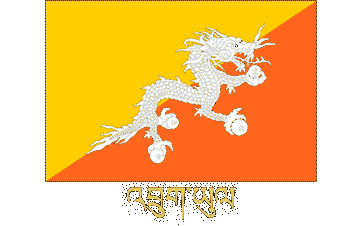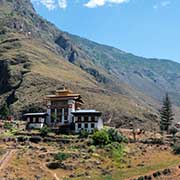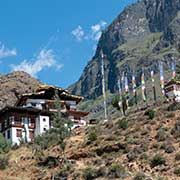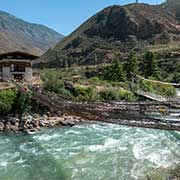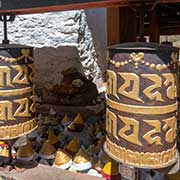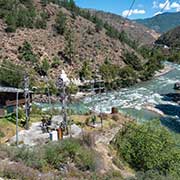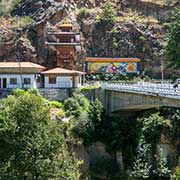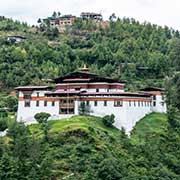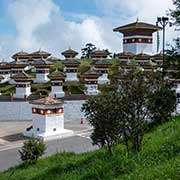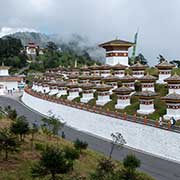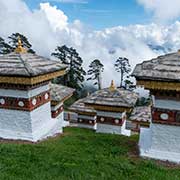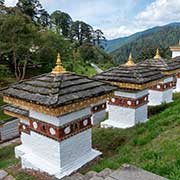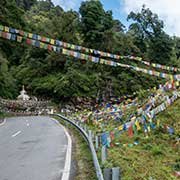Photos of western Bhutan
On the road in western Bhutan
Tachogang Lhakhang, the Tachog Monastery, is 18 kilometres from Paro on the road to Thimphu. It was founded by the Tibetan master Drubthob (“the Realised and Accomplished One”)Thangtong Gyalpo in the 15th century after he meditated here. The temple has three storeys, and each floor holds many sacred relics. He also constructed an iron chain-linked bridge over the Paro Chhu river in 1420-’30, probably at the same time as the temple. The original bridge was washed away in a flood in 1969 but was restored in 2005. Thangtong Gyalpo built over 58 iron bridges throughout Tibet and Bhutan to help pilgrims get to holy places.
you may then send it as a postcard if you wish.
Where the rivers Paro Chhu and Thimphu Chhu merge, forming the Wang Chhu, is the Chhuzom (meaning “Confluence of Rivers”) bridge. It was built in the 1960s when the roads were constructed, linking Paro with Thimphu. A pagoda and a large picture of King Jigme Khesar Namgyel Wangchuck with Queen Jetsun Pema is at the eastern point of the bridge, where a left turn goes to Thimphu and a right turn south to Phuntsholing.
About five kilometres southwest of Thimphu is Semtokha Dzong, a 17th-century fortress and monastery, visible from the Semtokha-Trashigang Highway, which goes 480 kilometres all the way from Thimphu to the east of Bhutan. The road crosses the Dochu La pass at 3,100 metres altitude, 22 kilometres from Thimphu. On this pass are 108 memorial chortens or stupas known as “Druk Wangyal Chortens”. These were built in 2003-2004 by Ashi Dorji Wangmo Wangchuk, the eldest Queen Mother. It is a memorial in honour of the Bhutanese soldiers killed in the December 2003 battle against Assamese insurgents from India who were raiding Assam from their 30 camps on Bhutanese territory. Nearby is the Druk Wangyal Lhakhang, a temple built in 2004-2008 in honour of the fourth Druk Gyalpo (King of Bhutan), Jigme Singye Wangchuck, as a memorial to celebrate 100 years of the monarchy.


